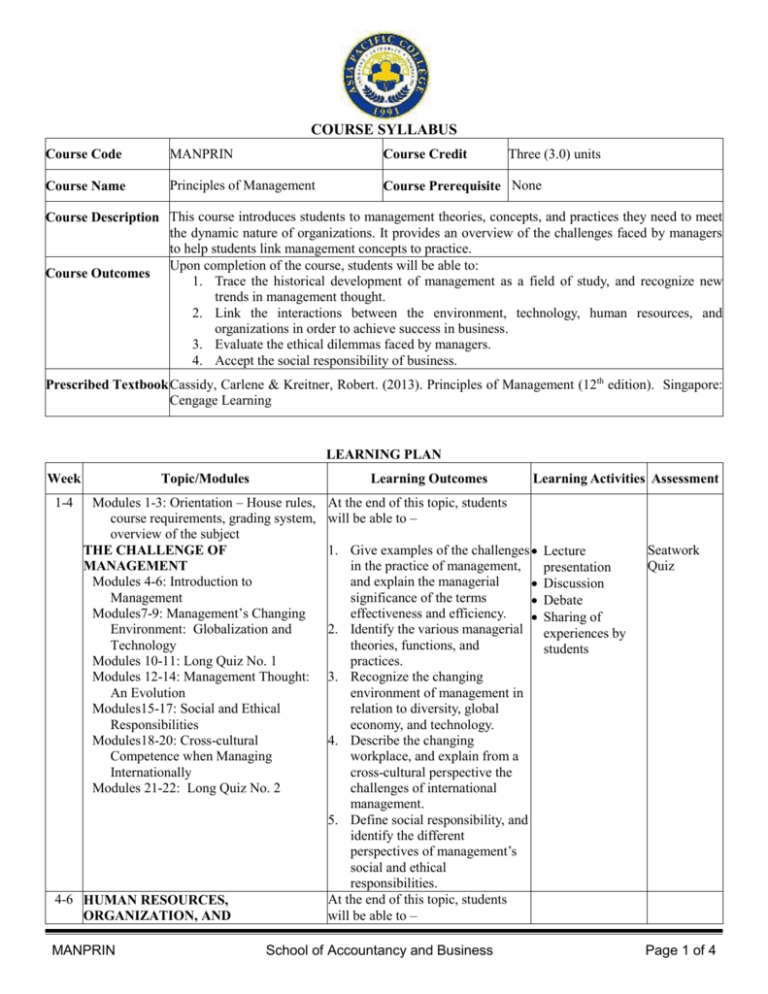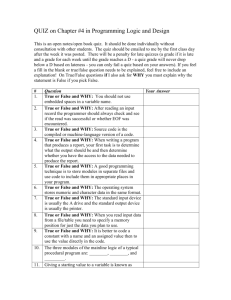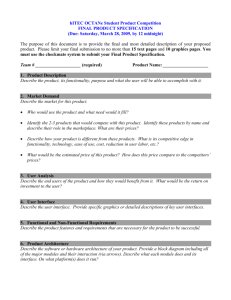
COURSE SYLLABUS
Course Code
MANPRIN
Course Credit
Three (3.0) units
Course Name
Principles of Management
Course Prerequisite None
Course Description This course introduces students to management theories, concepts, and practices they need to meet
the dynamic nature of organizations. It provides an overview of the challenges faced by managers
to help students link management concepts to practice.
Upon completion of the course, students will be able to:
Course Outcomes
1. Trace the historical development of management as a field of study, and recognize new
trends in management thought.
2. Link the interactions between the environment, technology, human resources, and
organizations in order to achieve success in business.
3. Evaluate the ethical dilemmas faced by managers.
4. Accept the social responsibility of business.
Prescribed Textbook Cassidy, Carlene & Kreitner, Robert. (2013). Principles of Management (12th edition). Singapore:
Cengage Learning
LEARNING PLAN
Week
1-4
Topic/Modules
Learning Outcomes
Modules 1-3: Orientation – House rules,
course requirements, grading system,
overview of the subject
THE CHALLENGE OF
MANAGEMENT
Modules 4-6: Introduction to
Management
Modules7-9: Management’s Changing
Environment: Globalization and
Technology
Modules 10-11: Long Quiz No. 1
Modules 12-14: Management Thought:
An Evolution
Modules15-17: Social and Ethical
Responsibilities
Modules18-20: Cross-cultural
Competence when Managing
Internationally
Modules 21-22: Long Quiz No. 2
4-6 HUMAN RESOURCES,
ORGANIZATION, AND
MANPRIN
Learning Activities Assessment
At the end of this topic, students
will be able to –
1. Give examples of the challenges
in the practice of management,
and explain the managerial
significance of the terms
effectiveness and efficiency.
2. Identify the various managerial
theories, functions, and
practices.
3. Recognize the changing
environment of management in
relation to diversity, global
economy, and technology.
4. Describe the changing
workplace, and explain from a
cross-cultural perspective the
challenges of international
management.
5. Define social responsibility, and
identify the different
perspectives of management’s
social and ethical
responsibilities.
At the end of this topic, students
will be able to –
School of Accountancy and Business
Lecture
presentation
Discussion
Debate
Sharing of
experiences by
students
Seatwork
Quiz
Page 1 of 4
COMMUNICATION
Modules 23-25: Managing Human
Resources
Modules 26-28: The Design of Effective
Organizations
Modules 29-31: Modern
Communications
Modules 32-33: Long Quiz No. 3
Lecture
presentation
Discussion
Debate
Case study
Sharing of
experiences by
students
Seatwork
Quiz
Lecture
presentation
1. Discuss the function and role of Discussion
planning and project planning in Debate
business.
Case study
2. Define the term strategic
Sharing of
management, and explain its
experiences by
relationship to strategic
students
planning, implementation, and
control.
3. Explain the decision complexity
for modern managers, and
identify the steps in the creative
problem-solving process.
10-11 LEADERSHIP AND MOTIVATION
At the end of this topic, students
Modules 47-49: Performance and
will be able to –
Lecture
Motivation
presentation
Modules 50-52: How Groups Work
1. Differentiate and explain the
Discussion
Together
various motivational theories. Debate
Modules 53-55: Leadership, Power, and 2. Demonstrate how motivating Case study
Influence
for performance helps an
Sharing of
Modules 56-58: Managing Change and
organization.
experiences by
Conflict
3. Explain how companies are
students
Module 59-60: Long Quiz No. 5
striving to motivate today’s
diverse workforce with qualityof-work-life programs.
4. Discuss the criteria and
determinants of team
effectiveness.
5. Define leadership, and identify
the different leadership theories.
6. Apply the concept of emotional
intelligence in an actual
situation.
7. Identify and describe the types
of organizational change and
how to deal with resistance to
change.
Seatwork
Quiz
MANPRIN
Page 2 of 4
1. State the fundamentals of
organizing.
2. Differentiate the different
organizational structures.
3. Describe the characteristics of
organizational culture.
4. Explain human resource
management.
5. Discuss the communication
process, identify the five
communication strategies, and
specify the guidelines in using
those strategies.
7
MID TERM EXAMINATION
Modules 34-36: Exam
7-9 STRATEGY AND PLANNING
Modules 37-39: Project Management and
Planning
Modules 40-42: Strategizing for Success
Modules 43-45: Problem Solving and
Decision Making
Modules 44-46: Long Quiz No. 4
At the end of this topic, students
will be able to –
School of Accountancy and Business
Seatwork
Quiz
12 ORGANIZATIONAL CONTROL
Modules 61-63: Managing Quality and
Control
Module 64: Long Quiz No. 6
13 GROUP PROJECTS
Modules 65-70: Project Presentations
8. Give an example of conflict
management, and identify the
strategies in conflict resolution
and negotiation.
At the end of this topic, students
will be able to –
Lecture
presentation
1. Recognize the different types of Discussion
control and the components
Debate
common to all control systems. Case study
2. Discuss organizational control Sharing of
from a strategic perspective.
experiences by
3. Give examples on the key
students
elements of a crisis management
program.
4. Identify the types of product
quality.
5. Apply total quality management
(TQM) in a business setting, and
specify the basic TQM principles
and process improvement tools.
Seatwork
Quiz
Students are expected to apply the
fundamental management concepts
and principles in their projects
(mock business plan).
14 FINAL EXAMINATION
References
Books
Bateman, T. & Snell, S. (2012). Management: Leading and Collaborating in a Competitive World
(8th edition). New York: McGraw-Hill/Irwin.
Medina, R. (2013). Business Organization and Management. Manila: Rex Bookstore, Inc.
Robbins, S. P. & Coulter, M. (2013). Introduction to Management (9 th edition).
Pearson/Prentice Hall.
New Jersey:
Weihrich, H. (2013). Management: A Global and Entrepreneurial Perspective (12 th edition). New
Delhi: McGraw-Hill.
Williams, C. (2013). Management. Sydney: Cengage Learning.
Webliography
Free Companion Content for Students
https://www.cengage.com/search/productOverview.do?Ntt=kreitner
Grading System
Class Standing 1st half
20 (includes quizzes, assignments, recitation, seatworks)
Mid-Term Exam
20
Class Standing 2nd half
20 (includes quizzes, assignments, recitation, seatworks)
Project Presentations
Final Exam
TOTAL
Passing Rate
MANPRIN
20
20
100%
70%
School of Accountancy and Business
Page 3 of 4
Prepared by
Ma. Cecilia R. Asoy
March 14, 2016
Approved by
Classroom Rules:
1. Each module is a 35-minute classroom instruction.
2. A student is considered late, and is considered half-absent, if he/she arrives in class after the official start time but
within the allowable period of 40 minutes.
3. A student is considered absent from class if he is not present within the first 40 minutes of the scheduled class session.
4. A student is held responsible for all course requirements and for the entire content of the sessions missed regardless of
the reason/s for his/her absences.
MANPRIN
School of Accountancy and Business
Page 4 of 4






